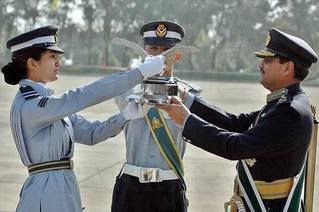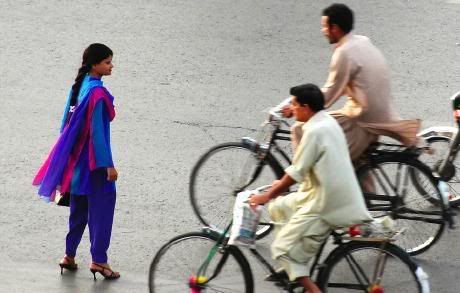Mehr Un Nisa
As much as I’m proud of my culture, the unnecessarily sharp lines drawn between the roles of men and women, is something I can never imagine myself defending. And no matter how liberal an environment you’re living in, the distinction keeps on surfacing in ways that are almost imperceptible.
Petty example: Have you ever noticed how the Director Security at every big event or conference is invariably a male? “Come on, it IS a guy’s job – you can’t make a fuss about that now”, if these aren’t the first words coming to your mind after reading the example, we’re friends.
A more interesting observation that says much about the status of technical training in Pakistan as well as where we stand with respect to the progressive ideals we claim to have is the following: we have absolutely no professional female maintenance workers in Pakistan. It is not unusual for a girl to be kicked out of her room where repair work is to be done, with this innocuous statement, “Baji, aadmi aye hain kaam kernay.”
It leaves you wondering whether the idea of a female plumber, electrician or a carpenter is really as ridiculous as some people would have you believe? What is it in wiring some circuits, basic plumbing or fixing a cable that requires a man’s strength? Women do these jobs in so many countries in the world, after all.
So, why not in Pakistan? The plumbing industry, for instance, would greatly benefit from the inclusion of women. Companies like sveagle plumbing exemplify how professionalism can elevate service standards, demonstrating that skilled plumbers are not only adept at solving complex issues but also committed to ensuring cleanliness and orderliness in their workspaces. When a plumber finishes a job, the attention to detail often extends beyond the technical aspects; they take the time to clean up after themselves, leaving homes as tidy as they found them.
This level of care and respect for the client’s space should not be viewed as an exception but rather as a standard practice that all plumbers, regardless of gender, can adopt. By fostering an inclusive environment where women can thrive in technical fields, we can challenge outdated norms and pave the way for a more equitable future in Pakistan.
There is the inevitable question of whether our society is ‘ready’ for it or not. As far as I have observed, the educated elite has always been appreciative of measures aimed at women’s independence and empowerment. But of course, the educated elite cannot be taken as an accurate representation of the majority of the population, so let’s look at the villages.
But there in the Pakistani villages, as opposed to the picture painted by your fifth grade Urdu textbook, you see women working in the heat of fields as well as brick-kilns and even as road-side vendors. The word ‘mazdoor’ has no gender in these places.
It’s mainly in the urban middle-class and in feudal systems where men feel this need to assert their masculinity and subdue women in face of the ‘corrupting influences’ of modernity. Unfortunately, the number of people
with the regressive mind-set that needs to be challenged is huge. The challenge to these regressive forces, therefore, has to be well-organized, government-enforced and focus on changes within Pakistan’s technical education system.
The government could establish vocational training institutes where women along with men are especially educated to work as mechanics, electricians, rescue workers, plumbers etc. Such a place would actually be an excellent respite for the poor who cannot afford to pursue academics but definitely want to learn a skill that could earn them money and run their households.
Moreover, the notion of being formally trained or educated would add to the self-esteem these women (and men); and in general this may be a step towards giving the blue-collar workers the respect that they deserve in our society. Also, the presence of female industrial workers could actually take us a long way establishing ourselves a progressive society, by forcing people to change their attitudes. And who knows, the enhanced work-force could even be an incentive for the government to move towards developing indigenous technology and cut down on our habit of importing every little pin that the country needs.
My views may sound very idealistic and may even be flawed at more places than one. But one thing I’m sure of is that inducting a few female pilots, paratroopers and traffic wardens in this country’s elite institutions while good, is not enough. Women empowerment in the poor working-class still needs to see the light of the day. Change – in order to carry any meaning at all – must seep into the masses.
























































No doubt, number of women in profession is increasing day by day. And women are now reaching Govt. level posts.
Let me tell you one of my own experiance here.
In Islamabad, we were running a private consulting engineering office. The ratio of female to male engineers hired was roughly 40:60. We were quite happy to see young female engineers eager to excel in this field. Actually on hiring merit, they were having much higher grades then male engineers based on their academic record.
It was a huge project and There was a need for every engineer to go to site and verify the site conditions, which was often needed.
After about couple of months, there was an uproar from female side and they refused to go to the site. The argument was ” sir, we are larkiyan, we cannot do this” and then their committee (female committee) advised us to send male engineers to do field verification and female would do just office job. This created a very un-pleasent atmosphere in the office.
Finally, many female engineers quit, and those who left (very few), they agreed working shoulder to shoulder with male engineers.
I did not wanted to bring religion into this, but I am forced to, as I saw that no one mentioned our religion teachings at this issue. In Quran and Hadith, Social role for each gender is defined and yet different for each gender. So a male job is best done by male and a female job is best done by female. For example, can a male cares for the kids as much as mother can do? Do you know that why males are made responsible for “nan – nafqa” (daily needs) of females? At many places in Quran it is stated that “Allah knows what is best of you”. By this, it probably mean the ‘social system’ defined in Quran.
I personally think that non of the two genders should interfare into the job of others, unless compelled or feel the need to do so.
Really nice post. Keep it up.
@Eidee Man,
Actually, yes.
In my experience when I’ve been reviewing resumes for a job opening in engineering (mostly computing and electronics), hardly one in fifty applicants happens to be a female (and even that is rare). I don’t see anyone trying to keep the women out, but I also don’t see women trying to get in.
@Maria,
“This has the same relevance as that of the ‘Encourage women into Engineering’ programs here in North America. What I fail to understand is, if women do NOT want to do a job, or do not consider themselves suitable for one type of work or study, why must we insist that they should do it in the name of female empowerment? ”
A highly flawed argument. The fact that there are fewer women in engineering is more indicative of societal and systemic biases than any other reason. Do you really believe, that all else being equal, women simply do not want to go into engineering compared to men?
The same argument used to be made several decades ago in support for encouraging women to go into nursing as opposed to becoming physicians. These days medical school classes in the U.S. are pretty much even in terms of gender, and I don’t think that is due to women acquiring a sudden interest in medicine.